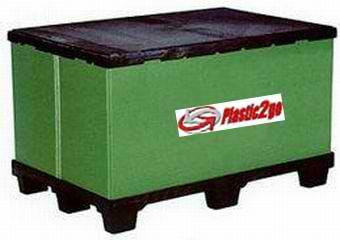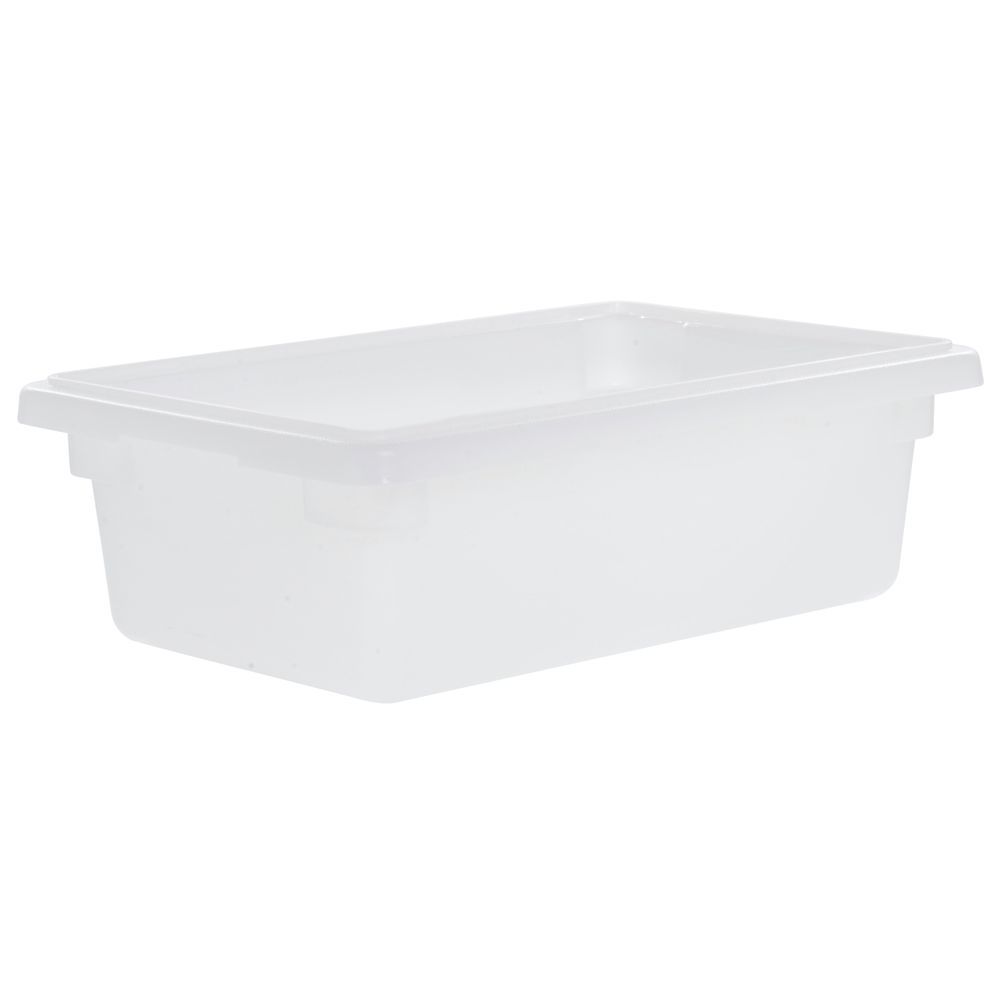Discover efficient ways to organize goods with plastic bulk containers
Wiki Article
The Duty of Bulk Plastic Containers in Effective Recycling Practices and Sustainability
Mass plastic containers are essential to contemporary reusing efforts. Their style boosts the effectiveness of product collection and transport, adding to sustainability goals. These containers not only enhance area yet additionally aid in keeping track of contamination levels. Their implementation is not without challenges. Understanding the complete extent of their influence discloses a complicated connection between logistics and environmental responsibility that warrants more expedition.Comprehending Bulk Plastic Containers
Mass plastic containers work as an essential component in numerous sectors, assisting in the storage and transportation of goods. These containers are normally made from robust materials such as high-density polyethylene (HDPE) or polypropylene, which provide toughness and resistance to environmental aspects. Their style often consists of features like stackability and modularity, enabling efficient usage of area throughout both storage space and transportation.Industries such as farming, food handling, and manufacturing regularly use mass plastic containers as a result of their lightweight nature and simplicity of handling. The containers are available in numerous dimensions and setups, accommodating the details needs of various items. Their flexibility prolongs beyond simple functionality; they can additionally be tailored with lids, handles, and identifying options to enhance use - plastic bulk containers. As a result, bulk plastic containers play an important role in maximizing logistics and supply chain operations across numerous sectors, consequently adding to overall effectiveness and cost-effectiveness
Advantages of Using Bulk Plastic Containers in Recycling
When companies focus on reusing efforts, the usage of mass plastic containers considerably improves the performance of the process. These containers are created to maximize room, permitting the storage and transport of bigger amounts of recyclable products. This causes less journeys to reusing centers, therefore decreasing fuel usage and connected discharges.Furthermore, mass plastic containers are resistant and resilient to various environmental factors, guaranteeing that materials stay safeguarded during handling and transit. Their light-weight style further adds to reduce transportation costs.
The harmony of these containers assists in much better sorting and processing of recyclable products, which can boost overall recycling rates. Organizations that adopt bulk plastic containers additionally show a commitment to sustainability, favorably influencing their brand image. Inevitably, these benefits not just enhance recycling techniques however additionally add to wider environmental goals
Just How Bulk Plastic Containers Facilitate Product Collection
Effective product collection is considerably boosted by the use mass plastic containers, as they offer a efficient and structured remedy for gathering recyclable products. These containers are designed to fit huge volumes of products, which streamlines the sorting and storage procedure. Their stackable style maximizes room utilization, making it easier for centers to arrange recyclables without clutter.In addition, bulk plastic containers are weather-resistant and long lasting, permitting for outside positioning without degradation. This strength guarantees that materials continue to be protected up until they are gathered for handling.

The harmony in shapes and size of these containers assists in standardization throughout collection factors, making it possible for better tracking of recyclable volumes. In addition, their transparent nature enables simple exposure of materials, assisting in the surveillance of contamination degrees and assuring that just appropriate materials are collected. Generally, mass plastic containers play an important duty in enhancing the product collection procedure, therefore promoting effective reusing techniques.
Transport Effectiveness and Environmental Effect
Transportation performance plays an essential duty in the reusing process, particularly through the optimization of lots ability in mass plastic containers. By making the most of the volume of product moved, firms can considerably minimize the number of trips needed, thus reducing their carbon footprint. This approach not just boosts functional effectiveness however additionally adds to a lot more sustainable ecological methods.
Enhancing Lots Ability
Although optimizing tons capability is frequently ignored, it plays a crucial role in enhancing transport performance and decreasing environmental effect in reusing practices. By making the most of the volume that bulk plastic containers can hold, reusing procedures can minimize the number of trips required for transportation. This not only lowers gas intake however likewise decreases the damage on lorries. Reliable tons management permits centers to make use of room successfully, making certain that each transport cycle is as efficient as possible. Additionally, well-optimized lots can cause much better negotiations with logistics service providers, possibly minimizing overall prices. Inevitably, improving lots capability adds to a much more sustainable reusing system by fostering reliable resource usage and lessening waste generated throughout transportation.Lowering Carbon Footprint
As reusing procedures undertaking to reduce their ecological effect, reducing the carbon footprint connected with transportation arises as an essential goal. Mass plastic containers play an essential duty in achieving this goal by boosting load efficiency and enhancing logistics. Their light-weight yet resilient layout permits maximum freight room usage, lowering the variety of journeys required to move materials. By consolidating deliveries, recycling facilities can reduce gas intake and greenhouse gas emissions. In addition, purposefully situating recycling centers lessens transport ranges, in addition decreasing carbon outputs. In addition, using fuel-efficient vehicles and alternative energy sources improves total sustainability. By integrating these methods, the reusing sector can considerably diminish its carbon impact, adding to a much more lasting future.Difficulties in making use of Bulk Plastic Containers

Contamination Issues
Contamination concerns stand for a substantial challenge in the efficient usage of mass plastic containers within reusing methods. These containers commonly accumulate residues from previous components, leading to blended products that can hinder the reusing procedure. Impurities such as food waste, chemicals, or non-recyclable products can compromise the honesty of the whole batch, causing increased disposal prices and decreased reusing rates. Additionally, improper cleaning or sorting can aggravate these problems, making it tough for reusing centers to refine materials successfully. The existence of impurities not just affects the high quality of recycled items but also weakens the overall sustainability efforts targeted at minimizing plastic waste. Addressing these contamination difficulties is critical for boosting the efficacy of bulk plastic container recycling.Recycling Framework Limitations
Ineffectiveness in recycling framework postures substantial obstacles for the effective administration of mass plastic containers. Many reusing facilities do not have the ability to process huge quantities of these containers efficiently, resulting in increased delays and costs. Poor arranging modern technologies commonly lead to contamination, as bulk containers might be blended with various other products, making complex the recycling procedure. Restricted transportation choices likewise impede the activity of mass plastic containers to ideal reusing facilities, leading to raised landfill waste. Additionally, an absence of standardized protocols for bulk container recycling creates confusion amongst businesses and customers, further complicating initiatives to bulk plastic containers for sale advertise sustainability. Attending to these framework restrictions is important to improve recycling practices and maximize the capacity of bulk plastic containers in a circular economic situation.Best Practices for Executing Mass Plastic Containers
When organizations consider applying mass plastic containers in their recycling techniques, they ought to prioritize a strategic method that improves efficiency and decreases contamination threats. Picking the proper container size and kind is necessary to accommodate the quantity of materials being refined. Organizations must additionally develop clear labeling and signs to guide customers on appropriate disposal approaches, minimizing complication and errors. Routine training sessions for staff can better reinforce these practices, making sure everybody understands their duties in maintaining reusing honesty.
In addition, organizations ought to carry out a regular maintenance schedule to examine and tidy containers, preventing the buildup of pollutants. Partnering with regional reusing centers can additionally improve the collection procedure, making sure that products are efficiently refined. Lastly, organizations must monitor and evaluate their recycling metrics, utilizing this information to refine techniques in time and advertise constant improvement in their sustainability initiatives.
The Future of Bulk Plastic Containers in Lasting Practices
As organizations increasingly focus on sustainability, the duty of mass plastic containers in recycling techniques is established to evolve substantially. Advancements in materials science are resulting in the advancement of recyclable and eco-friendly options, enhancing the ecological benefits of bulk plastic containers. On top of that, the execution of closed-loop systems will enable much easier collection and repurposing of these containers, lowering waste and resource usage.Technological improvements, such as smart tracking systems, will certainly allow business to keep track of the lifecycle of mass containers, boosting performance in reusing procedures. As customer demand for lasting practices grows, companies will likely adopt bulk plastic containers made for reuse and lasting value. Collaboration between industries and governments will certainly promote the facility of standardized recycling protocols, making sure that bulk containers are successfully integrated into wider sustainability initiatives. Overall, the future of mass plastic containers shows up encouraging, with significant potential for adding to a round economic climate.
Frequently Asked Inquiries
How Are Bulk Plastic Containers Made and What Materials Are Made use of?
Bulk plastic containers are generally made from high-density polyethylene (HDPE) or polypropylene (PP) These products are processed with shot molding or strike molding strategies, causing sturdy, lightweight containers suitable for numerous storage space and transportation demands.
Can Bulk Plastic Containers Be Reused Numerous Times Before Recycling?
Yes, bulk plastic containers can be recycled numerous times prior to reusing. Their durability and design enable duplicated use in different applications, promoting sustainability and resource effectiveness while reducing the demand for new containers.
What Accreditations Exist for Mass Plastic Containers in Recycling?
Various accreditations for mass plastic containers include the Recycling Collaboration's accreditation, the Cradle to Cradle Licensed ™ standard, and the Lasting Packaging Coalition's standards, making sure containers meet certain ecological and recyclability requirements for efficient recycling.Just How Do Bulk Plastic Containers Contrast to Other Recycling Storage Options?
Mass plastic containers offer better toughness and capability contrasted to various other reusing storage choices, reducing the risk of contamination and facilitating effective transport. Their style sustains much better company, enhancing overall performance in recycling operations.What Is the Lifespan of a Mass Plastic Container in Recycling Processes?
The life-span of a bulk plastic container in recycling procedures commonly varies from 5 to ten years, depending on usage, worldly quality, and ecological conditions, enabling numerous cycles of usage before eventual disposal or recycling.When organizations focus on recycling efforts, the utilization of mass plastic containers greatly enhances the efficiency of the process. Transportation performance plays a vital role in the reusing process, especially via the optimization of load ability in bulk plastic containers. The usage of mass plastic containers in recycling methods encounters considerable difficulties, specifically concerning contamination issues and constraints within recycling framework. Contamination concerns stand for a substantial challenge in the efficient usage of bulk plastic containers within recycling methods. When organizations take into consideration applying mass plastic containers in their reusing techniques, they should prioritize a calculated method that boosts effectiveness and reduces contamination threats.
Report this wiki page